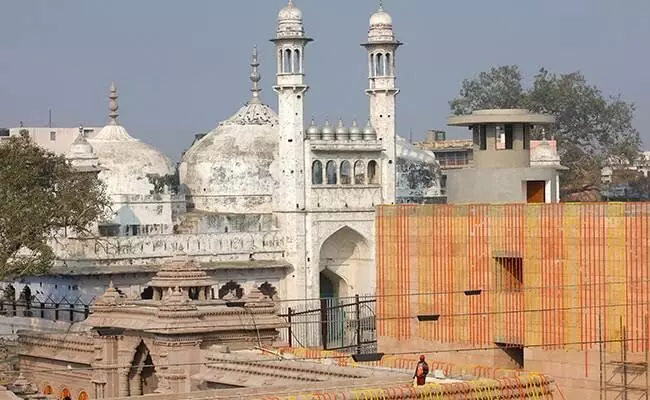
Varanasi District Court to pronounce verdict on carbon dating of Shivling today
text_fieldsLucknow: The Varanasi District Court will today hear the matter pertaining to the Gyanvapi Mosque-Gauri Shringar case. As per the sources, the court is also expected to take a decision regarding the carbon-dating of the structure found inside the complex which has been claimed as 'Shivling' by the Hindu side.
During the last hearing in the case that took place on September 29, advocate Vishnu Jain, representing the Hindu side, had said that the Hindu side demanded a scientific investigation into the claimed Shivling inside the complex by the Archaeological Survey of India.
Four of the five Hindu women petitioners had filed the "scientific investigation" plea last month, saying it was necessary to determine the age of the 'Shivling'.
In their plea, the women said such an investigation could involve the carbon dating process and be carried out by the Archaeological Survey of India, a government body.
One of the five Hindu women, though, had taken a divergent view, objecting to the scientific investigation plea by the four other women, saying that any testing, including carbon dating, may harm the 'Shivling'.
The mosque committee had also objected to the scientific investigation plea, saying that the case by the Hindu women was about worshipping at a shrine inside the mosque and had nothing to do with its structure. The mosque committee said the object which is being called as a 'Shivling' was actually a "fountain".
On September 12, the Varanasi district judge dismissed a challenge by the mosque committee that said the case by the Hindu women for year-long worship inside the mosque complex had no legal standing. Their challenge was rejected on all three counts that they had cited. The most important of these is the 1991 law that freezes the status of a place of worship as it existed on August 15, 1947. The petitioners didn't want ownership, just the right to worship, the court ruled.
The Gyanvapi mosque, located in Prime Minister Narendra Modi's constituency, Varanasi, is one of the several mosques that Hindu hardliners believe were built on the ruins of temples. It was one of the three temple-mosque rows, besides Ayodhya and Mathura, which the BJP raised in the 1980s and 1990s, gaining national prominence.






















